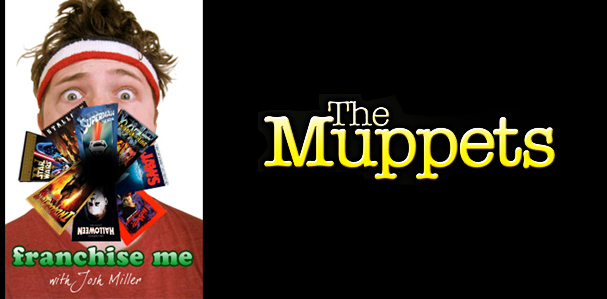
Hollywood loves a good franchise. The movie-going public does too. Horror, action, comedy, sci-fi, western, no genre is safe. And any film, no matter how seemingly stand-alone, conclusive, or inappropriate to sequel, could generate an expansive franchise. They are legion. We are surrounded. But a champion has risen from the rabble to defend us. Me. I have donned my sweats and taken up cinema’s gauntlet. Don’t try this at home. I am a professional.
Let’s be buddies on the Facebookz!
The Franchise: The Muppets — following the schtick-heavy misadventures of an eclectic race of puppet-like beings who thrive and survive amongst us in the regular human world. Birthed in the mid-1950’s by puppeteering super-champ Jim Henson for use in advertising commercials, the Muppet aesthetic/brand has since infiltrated every conceivable niche, medium and outlet imaginable, including television, music albums, motion pictures, video games, comic books, view finder stories, and literature. Since I imagine some may be disappointed to learn that I won’t be covering The Muppet Show, I figure an explanation is due… The reason is twofold: 1) While The Muppet Show is obviously where Henson’s Muppet creations solidified into the form we think of when we hear “the Muppets,” it was really just the culmination point of Henson’s success story; several of the central Muppets, like Kermit, Rolph and Gonzo, had already existed for many years by that point, as had the word “Muppet” to describe them. And more importantly, 2) TV is a can o’ worms. Why include that show and not Sam and Friends, Sesame Street, The Jim Henson Hour, Muppet Babies, Little Muppet Monsters, Muppets Tonight, etc, etc? And then there are the crazy number of TV movies and specials. It defeats the entire purpose of this column for me to pick and choose installments based on what I think is “good” or “relevant.” It is easier and frankly I think more interesting to boil the franchise down to something that is readily discussable — like the Muppets’ ventures onto the big screen. So, for the sake of tidiness, I will be battling the six theatrical feature films, plus the forthcoming The Muppets relaunch.
The Installment: The Muppet Movie (1979)
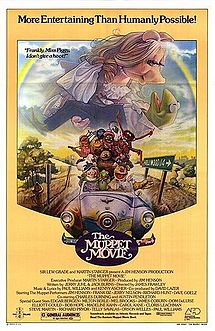
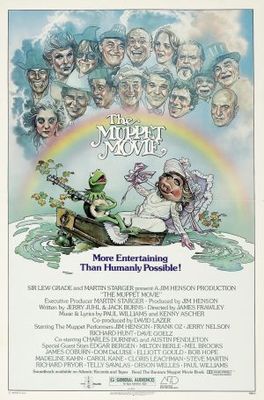
The Story:
We open at the gates of the World Wide Studios lot, as two grumpy old fuckers named Statler and Waldorf arrive for a special premiere screening of a movie they are quite confident will be terrible, The Muppet Movie — which we soon learn will tell us the origin story of the Muppets gang. Jumping into the proper narrative, we meet Kermit the Frog kickin’ it frog style (ie, playing a banjo on a log) in a swamp. When Kermit crosses paths with an agent from Hollywood, played by lovable comedy footnote Dom DeLuise, Kermit is inspired to go chase his dreams. He quickly finds a kindred spirit in Fozzie Bear, a horrible stand-up comedian who happens to own a car. Together the newfound friends hit the road, where they slowly pick up most of the main Muppet ensemble, all while Kermit must evade the increasingly sinister advances of Doc Hopper (Charles Durning), a Colonel Sanders-esque entrepreneur who wants Kermit to be the mascot for his fried frogs’ legs fast-food chain. Together with his new friends, and new girlfriend (Miss Piggy), Kermit is able to make a rainbow connection (that sounds like a gay porn position) and not only defeat Doc Hopper, but achieve his shallow dreams of becoming famous.
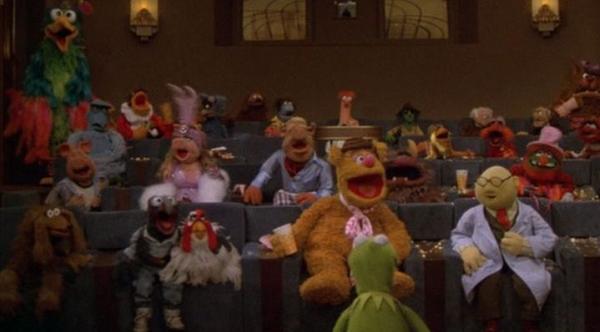
What Works:
The Muppet Movie is a small triumph. I doubt that anyone in 1979 thought you couldn’t make a movie starring the Muppets, but it is nonetheless impressive that Jim Henson and company were able to so successfully take the kind of vaudeville silliness audiences had fallen for on The Muppet Show and adapt that to the big screen in meaningful way — versus something like The Simpsons movie, which, regardless of whether or not you liked it, was little more than a really long The Simpsons episode. For all intents and purposes, The Muppet Show was a sketch show; though aspects of the show evolved over time (such as the romantic relationship between Kermit and Miss Piggy), it didn’t do a lot of character exploration and it didn’t leave the confines of the Muppet Theater — for those who have never seen The Muppet Show, it was a variety show intermixed with backstage antics of Kermit trying to keep things on track. So making the Muppets’ first big movie an origin story and a road trip is rather clever in that kind of way that seems fairly obvious after the fact. Of course it is an origin story! Yet, it is a canny origin story. Looking at the Muppets one can’t help but wonder, what exactly are they? Some Muppets are animals. Others are humans. Others are crazy monsters. Yet The Muppet Show had actual humans on it too. So are they some sort of subrace whose appearances echo our own, as well as various of Earth’s animal species? I like that the Muppets’ origin story isn’t trying to contextualize why/how they’re puppet-things. Wisely, and humorously, the movie not only makes no attempt to address this, but there is no sense that anyone views the Muppets as unusual either. No one is prejudice towards them, nor does anyone seem to make a connection between the various Muppets either (as in a “you people” or “you things” connection, like Who Framed Roger Rabbit? did with “Toons”). Miss Piggy wins a beauty contest in her first scene. But no one comments on the fact that she is a bipedal talking pig. This is just the way the world is, and the tactic allows for the filmmakers to tell a fairly classic “putting the band together” story instead of navel gazing at the fact that they’re all made of foam.
Aside from, obviously, using foam puppets, Jim Henson’s two biggest creative hallmarks were the use of old-fashioned schtick humor, particularly world play exchanges and puns (few main stream entertainers have been more dedicated to puns than Jim Henson), and great musical numbers. So, fittingly, The Muppet Movie‘s two biggest strengths are its script and the music. The script by Muppet Show head writers Jack Burns and Jerry Juhl isn’t exactly the most deft narrative (despite Dr. Teeth calling it a “narrative of very heavy-duty proportions”), but it is a flawless bit of unending schtick comedy. The funniest ongoing motif in the film is probably the acknowledgement that it is a film. Kermit addressing the theater audience was an integral part of the The Muppet Show, and though the context is now gone, keeping the fourth wall breaking was a smart move. And a funny one. After the second time that we’re given the same Hare Krishna joke (topical!), Kermit looks to the camera and grimaces, “Good grief, it’s a running gag.” Which is a great way of elevating a dorky bit to a more sophisticated state through absurdism (a Henson convention). But fourth wall breaking alone probably wouldn’t have gone over as well had the filmmakers not kicked it up a notch with the meta gimmick that all the Muppets are aware that they’re characters in a movie. I especially enjoyed the scene when Kermit and Fozzie simply give another character the film’s script instead of explaining their backstory. Naturally, mileage may vary here, depending on your existing opinion of groan-worthy wordplay and puns.
Mileage should not vary quite as much with the (I’d say) unquestionably extraordinary soundtrack composed and written by that wry imp of 70’s entertainment Paul Williams and fellow pianist/composer Kenny Ascher. If a bar graph were made of The Muppet Movie‘s strengths, it would probably be most laudable for its music. The true test of a great musical isn’t whether or not it produces a great song, but great songs, plural. Almost every single song in the film is a winner, from the bouncy good times of Kermit and Fozzie’s road trip anthem “Movin’ Right Along,” to Dr. Teeth and the Electric Mayhem’s psychedelic quasi-rap “Can You Picture That,” to Kermit and Rowlf’s anti-romantic bachelor’s rant “I Hope That Somethin’ Better Comes Along.” Rewatching the film as an adult, even some of the numbers that bored me as a kid now struck a chord; notably Gonzo’s sad and sweet campfire lament, “I’m Going to Go Back There Someday.” Muppeteer Dave Goelz’ Gonzo singing voice is surprisingly gentle and nuanced and the song’s aching tone is somewhat unexpected in such a silly film. And then first and foremost there is Williams and Ascher’s delicate Oscar-Nominated “Rainbow Connection,” which has rightfully taken on a life of its own over the past three decades, covered by artists as diverse as Willy Nelson and The Pussycat Dolls, and will more than likely long outlive the film itself.
Let’s talk humans for a second. Another familiarity of the Muppet Show was the hip roster of celebrity guest-hosts appearing week after week (and not once repeating). So, it presumably seemed necessary to jam the film full of celebrities as well, and overall the cameos lend entertaining charm to the film — usually when they’re kept short and sweet. James Colburn has a great two-line exchange with Kermit as a nightclub owner, and Orson Welles’s imposingly bearded girth is used with excellent climactic effect as Lew Lord, the Hollywood studio honcho who gives Kermit the “standard rich and famous contract” at the end of the film. (A wonderful stupid gag.) It was a ballsy move for Henson to keep the humans on the sidelines like this — other than our villains, Doc Hopper and his reluctant sidekick Max (Austin Pendleton), there are no human supporting characters in the film. But Henson and co. knew that the Muppets were the stars. I think it is great that they didn’t get nervous and toss in a human character to serve as a safeguard for audiences. Fuck humans.
Let’s talk Muppets now. Nostalgically, my favorite Muppets will probably always be Animal and Beaker, but here I gained a deeper appreciation for Fozzie Bear (Frank Oz). Fozzie most fully embodies the theme of The Muppet Movie, which is an old-fashioned drive to entertain. Like some Borscht Belt hack of yore, Fozzie is a comedy machine more so than an actual comedian. He isn’t funny and he seems to know no one thinks he is funny. Yet his enthusiasm is boundless. This is simply who he must be. He has no choice. Fozzie also most fully represents Henson’s love of dorky schtick humor; he’s vaudeville comedy at its absolute worst (aka best). I love Fozzie’s appreciation of lame humor, as presented in the film. Like when buying ice cream from a vendor played by Bob Hope — Fozzie tells the vendor he’d like honey, to which the vendor replies, “Honey? I beg your pardon, I hardly know you.” It is a very minor character moment when Fozzie makes a noise of “Ahhhh” acknowledging the vendor’s lame crack before continuing with “But seriously, I’d like a honey ice cream cone…” That short “Ahhh,” like one warrior acknowledging the prowess of another, entirely sums up Fozzie. Fozzie is my new favorite.
I don’t want to insult director James Frawley, as I have no inside knowledge on the production, but looking at his other directing credits I think it is safe to assume he was something of a hired gun on The Muppet Movie — there to make sure the ship made it into port on time while Henson and co. (who had never made a feature film) did their thing. A theory that seems credible considering that the next two films where directed by Henson and Frank Oz respectively. In any case, a movie is a team effort and The Muppet Movie team did some very impressive technical work here. In 1979, before computer wire removal and such, it must have blown some minds to see Kermit riding a bicycle while still moving his head around. But more so than fun tricks like that – or the blue screen full-body shots of Kermit and Fozzie dancing – the film is just impressive all-together. It is a movie starring fucking puppets. And though it has a visually simple style, the film becomes somewhat mind-boggling if you continually remind yourself that teams of puppeteers are hovering somewhere below camera in every shot. Outstanding even amongst the rest of the film is the lengthy dollying shot that introduces us to the Muppets as they sit in a studio screening room waiting for The Muppet Movie to begin (still shown above). We follow Kermit around the room as he greets his friends and coworkers, and I could only begin imagine the mayhem happening below the frame. The long first shot of Kermit in the swamp singing is also rather impressive.
I think Jim Henson is one of the most impressive creative superstars of the past 100 years, rivaled in scope of vision only by Walt Disney — who had the good fortune to not only live longer than Henson but reach his creative peak much earlier in his career. There is really no need to actually compare the two, though as far as personal talents go, Disney may have been the original voice of Mickey Mouse, but I’ll just note that Jim Henson is the voice of both of these characters…
..
Take that frozen head of Walt Disney! Let’s hear you harmonize with yourself.
Kermit can easily be seen as a metaphor for Henson himself in The Muppet Movie. One has to imagine that, like Kermit picking up aimless hopefuls along the road to Hollywood, Henson surely attracted every puppeteer he encountered with similar gravitational force. It is a small and lonely world for Muppets and for those who choose to perform with their hand up the ass of a stuffed animal. There is a strange honesty in this metaphor – especially in the lyrics to many of the songs – that is easy to overlook, but is nonetheless very much there; an honesty about the motivations that drove the Muppets/Muppeteers together, and the unlikely paradise they formed together. The most glaring example comes in the film’s finale (which concludes in the epic shot at the bottom of this article, featuring nearly every Muppet Henson ever created, including characters from Season 1 of Saturday Night Live). While the Muppets set up for their big show, they sing “The Magic Store.” Though the tone of the scene is light, and the objective point of the song is a standard “believe in yourself” message, the song’s lyrics also overtly hint at the kind of social isolation and pain that drives most entertainers to seek the spotlight. Here is a relevant bit:
Kermit:
It starts when we’re kids, a show-off in school;
Makin’ faces at friends, you’re a clown and a fool.
Doin’ prat-falls and bird-calls and bad imitations;
Ignoring your homework, now that’s dedication.
You work to the mirror, you’re getting standing ovations.
Muppets:
You’re burning with hope, you’re building up steam.
What was once juvenilish is
Miss Piggy:
grown-up and stylish,
Muppets:
You’re close to your dream.
Then somebody out there loves you,
Stands up and hollers for more;
Fozzie:
More!
Muppets:
You found a home at the Magic Store.
The desire to be loved is the sad-clown reality behind most comedians, and not a face one thinks of when one thinks of Henson or the Muppets. This movie marked the beginning of Henson Studios’s 1980’s creative golden age (cut tragically short by Henson’s death in 1990), yet the lyrics almost feel like a proud bucket list statement, a “I made it, Mah!” moment. And rightfully so. Building a respected and financially successful empire entirely on puppets is an truly, truly, truly ludicrous goal; made even more ludicrous by wanting these puppets to appeal to adults as well as children. Yet here Henson and his foxhole compatriots are. Looking at the movie this way, it is far more personal a creative statement than it seems at surface level.
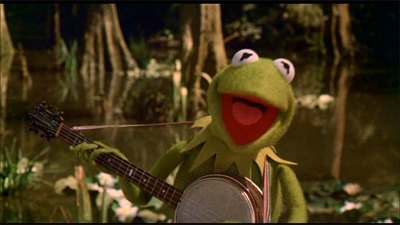
What Doesn’t Work:
While the celebrity cameos must have seemed entirely necessary in 1979, during the height of The Muppet Show, removed from that context all these decades later they can also be distracting if the celebrity is given more importance than the narrative. The filmmakers must have been tickled pink to have Mel Brooks (a kindred spirit of schtick comedy) on set as an evil German scientist hired by Doc Hopper, but his scene feels ad-libbed and runs on too long. Same goes for the Dom DeLuise scene. Not every gag in the film works great, and at times things can feel a little slow paced (this was 1979; different era), but when it is just the Muppets in a scene it is less noticeable than when the forward momentum is put on hold while we wait for a celebrity guest star to finish doing their so-so bit.
The Doc Hopper storyline is funny and Charles Durning is effortlessly wonderful as always, but considering how clever the movie is overall, the Hopper story thread fizzles out at the end rather lamely. Kermit and his friends, and Hopper and his goon squad of hunters, have an ‘Old West’ showdown in an actual ‘Old West’ ghost town. Kermit gives Hopper a moving speech about having friends that fails to move Hopper. But the day is saved when Animal (having consumed some of Dr. Bunsen Honeydew’s growth formula) bursts through the roof of a building in the background. Hopper and his goons run off scared. And that’s it. For such an interesting villain, this is a very uninteresting way to defeat him. The whole Hopper subplot is powered by the fact that Hopper can not be discouraged or swayed from his pursuit of acquiring Kermit, dead or alive. Not to get literal on such a silly film, but why would getting scared off by Animal stop Hopper from making future attempts to capture Kermit? The film could’ve done better here. In general, the film loses a little steam near the end.
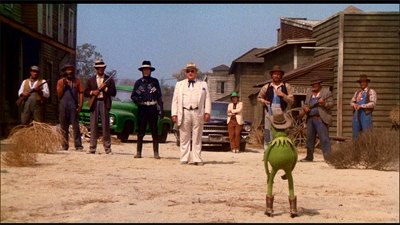
Celebrity Cameo Count: 16 (and I’m counting Big Bird)
Best Celebrity Cameo: Steve Martin as the Insolent Waiter who begrudgingly serves Kermit and Piggy on their date. Like Mel Brooks, Martin is given an extended bit, but every line of it is comedy gold. Like when the Waiter serves them the shitty wine Kermit purchased, which they think is champagne, but the Waiter corrects, “Not exactly. Sparkling Muscatel, one of the finest wines of Idaho.” He then opens it with a bottle opener and sarcastically asks Kermit if he’d “like to smell the bottle cap?”
Best Pun: To Miss Piggy. Gonzo: “If you were a chicken, you’d be impeccable.”
Worst (aka Best) Fozzie Joke: “Right, frog.” Said to Kermit, after Kermit, giving driving directions, tells Fozzie to “bear left.”
Most Ridiculous/Bizarre Joke: The “myth” running gag. Repeatedly throughout the film Kermit will have a conversation that leads him to say that something is a myth, at which time Carol Kane will suddenly pop out of no where, as if someone had just called her, and in her finest Carol Kane speech impediment ask, “Yeth?” So bizarre.
Best Meta Moment/Line: The aforementioned bit where Kermit and Fozzie give Dr. Teeth a copy of The Muppet Movie screenplay to catch him up on what’s happened in the film so far.
Joke No Child Could Understand: I recall being confused as hell by the ongoing Hari Krishna jokes as a lad.
Sadly Under-Featured Muppet: The uptight Sam Eagle.
Should There Have Been a Sequel: Hell yes.
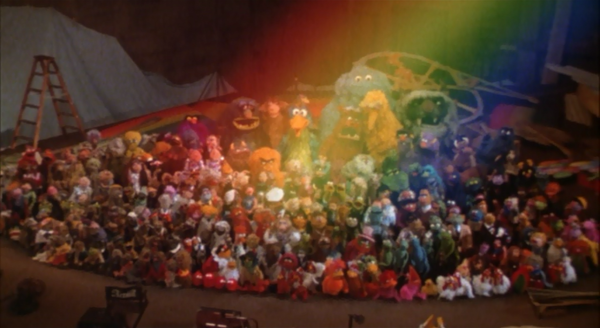
Up Next: The Great Muppet Caper
DISCUSS THE FRANCHISE ON THE BOARDS
previous franchises battled
Critters
Death Wish
Hellraiser
Leprechaun
Phantasm
Planet of the Apes
Police Academy
Rambo
Tremors